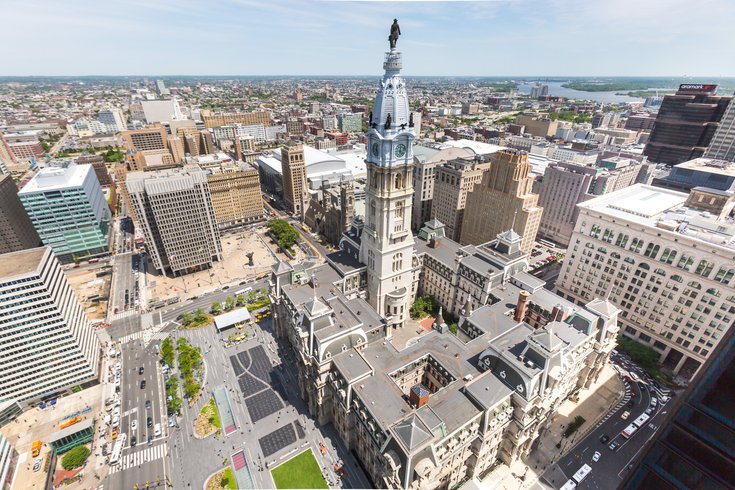
July 19, 2017
 Thom Carroll/PhillyVoice
Thom Carroll/PhillyVoice
William Penn envisioned Centre Square as the center of Philadelphia, complete with a meeting house, a marketplace and a state house. His plan never fully came to fruition but City Hall today is the center of Philadelphia government. This is a view of City Hall and Dilworth Park from the Residences at the Ritz-Carlton.
Outgoing Philadelphia Controller Alan Butkovitz warned city officials this week against repeating past mistakes when investing in costly technology initiatives, citing multiple instances of undelivered projects, waste and faulty implementation.
In a letter to Chief Innovation Officer Charles Brennan, Butkovitz outlined nearly $90 million in past technology systems that have not returned equal value to the city.
“Philadelphia has a history of jumping into costly projects and failing its citizens when it comes to operating in the 21st century," Butkovitz said.
Among the examples Butkovitz referenced is Philadelphia's $13 million investment in the development of OnePhilly, a Workforce Management System intended to integrate human resource functions with procurement and financial records. The software company contracted in 2014 to complete the work was supposed to bring the final product online in December 2015 for under $11 million. Two years later, another $2 million has been spent and OnePhilly remains incomplete.
“Millions of dollars were spent," Butkovitz said, "and we still don’t have a final working product."
Another $3.3 million contract awarded in 2014 to build a cross-departmental budgeting system hasn't yet delivered a final product, prompting an audit by Butkovitz's office.
The letter cited several other questionable projects and findings in recent years:
• $50 million for five different water billing systems from 2007 through 2012 (2012 audit)
• $13.9 million for police surveillance cameras, of which only half were found to be working properly (2012 audit)
• $6 million annually for Philly311 which 90 percent of the calls went unmonitored (2011 audit),
• $2 million for unused wireless equipment found stored in unopened boxes in the back of a city-run warehouse (2015 report)
"While the OnePhilly project and the budgeting software system are still ongoing issues, the examples listed above were initiated under Mayor Nutter's Administration," Butkovitz said. "With that said, the city' s new leadership has an opportunity to invest strategically and methodically in future technology."
One of the first moves made by Mayor Jim Kenney's administration was a reorganization of the city's Office of Innovation and Technology. Last May, two teams from OIT were split off to form the Office of Open Data and Digital Transformation, which operates under the Office of the Chief Administrative Officer.
Philadelphia's former chief administrative officer is Rebecca Rhynhart, who defeated Butkovitz in the May Democratic primary for City Controller.
A Smart Cities Council grant awarded to Philadelphia and four other U.S. cities in February will help enhance municipal services by building on existing infrastructure. In the future, the city is looking to implement ideas submitted as part of last year's "Smart City Challenge," a program focused on Internet of Things applications.
In recent months, Butkovitz has scrutinized several city initiatives and revenue streams, including the BigBelly solar trash cans placed around the city and long-term projections for the soda tax.
He also renewed his feud with former Mayor Nutter over the alleged $240,000 in questionable credit card purchases from an account tied to the non-profit Mayor's Fund. Ashley del Bianco, who served as the non-profit's executive director under Nutter, stepped down from her post last month but will remain the city's chief grants officer.
Butkovitz said the most alarming issue facing Philadelphia is that city has not developed a plan to deal with a disaster or disruption of services to critical government systems used on a daily basis — tax payment processing, water bills, contracts and pension and payroll checks.
“Taking the necessary actions, which many are listed in our latest audit, will ensure Philadelphians, businesses and visitors that our city can apply the latest technology to provide the highest level of services."